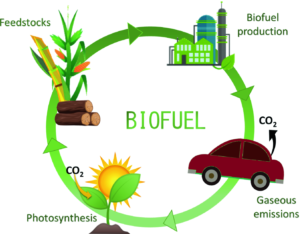The growth of biofuel production, also known as the “green fuel”, from crops will have a direct impact on the land and the environment, read more about this sustainable business model and its impact on the energy industry.
WHAT ARE BIOFUELS?
Everything living, be it plants or animals, is made up of carbon. When they die, the carbon is recycled by decomposition and re-enters the environment in the form of carbon dioxide. This is then utilized by plants to create energy via photosynthesis. Biodiesel is mainly made from a varied mix of feedstocks that include soybean oil, recycled cooking oil, and animal fats, this fuel has many benefits because it improves air quality, increases energy security, and it also ensures the safety of the people.
Biodiesel helps in reducing the risks of global warming by lowering the carbon emissions in the atmosphere. Biofuel is also extremely helpful in thermal oil heating systems where it is used in tank heating, suction heating, reactor, and vessel heating, natural gas heating, jacketed vessel heating, inline gas heating, and crude oil heating among various other applications.
In biofuels, the plants, or products derived from them, are burned and carbon dioxide enters the atmosphere once again. The carbon is constantly recycled and if the plants were not used as the fuel they would be consumed by animals and the carbon dioxide would then be breathed out into the air.
Biodiesel is used in the common diesel engines substituting the traditional petroleum diesel. Poly diesel fuel tanks are manufactured to supply fuel in prime conditions because they are resistant to both gasoline and diesel fuel. Biodiesel can be pumped, stored, and even burned like petroleum diesel fuel. It can be utilized in its purest form and can also be used when blended with petroleum diesel fuel.
IMPACT OF BIOFUEL ON THE ENVIRONMENT
Biofuel production might be a small part of the total energy demand, however, it has significant environmental and social implications.
ROLE OF BIOFUELS IN CLIMATE CHANGE
Biofuels vary majorly in their greenhouse gas balances. When compared with petrol, greenhouse gases can also be emitted by direct or indirect land-use changes caused by increased biofuel production, for example when carbon stored in forests or grasslands is released from the soil during land conversion to crop production. There exists a wide range of biofuels like Biodiesel from palm oil, feedstocks, and production and conversion technologies, hence, we would expect a wide range of outcomes in terms of emission reductions. A comprehensive understanding and analysis of the relevant issues, including land-use change, and proper assessment of greenhouse gas balances are prominent in order to ensure that bioenergy crops have a positive and sustainable impact on climate-protection efforts.
INFLUENCE OF EXPANSION OF CULTIVATED AREA ON BIOFUEL PRODUCTION
Agricultural techniques and land usage pattern determine greenhouse gas balances, significant yield gains, and technological advances are essential for the sustainable production of biofuel feedstocks in order to reduce the rapid land-use change in areas already under cultivation and the conversion of land not currently in crop production, like grassland or forest land.

Image Courtesy: Springerlink
NEGATIVE IMPACT OF BIOFUELS
LOSS OF BIODIVERSITY
By converting forest or grassland entirely into crop production, it can have a significant effect on wild biodiversity, due to the loss of habitat. Various current biofuel crops are well suited for tropical areas, and this enables an economic incentive to convert natural ecosystems into plantations causing a loss of wild biodiversity in these areas; agricultural expansion driven by higher prices could endanger areas rich in bird species diversity as well.
ERODING SOIL OF ITS NATURAL RICHNESS AND NUTRIENTS
Both land-use change and intensification of agricultural production on existing croplands can have significant adverse impacts on soils, but these impacts – just as for any crop – depend mainly on farming techniques. If inappropriate cultivation practices are followed for a long time, they can reduce soil organic matter and increase soil erosion by removing permanent soil cover. It will also lead to the removal of plant residues which can reduce soil nutrient contents and increase greenhouse gas emissions through losses of soil carbon.
CAN ENVIRONMENTALLY SUSTAINABLE BIOFUEL PRODUCTION BE ENSURED IN INDIA?
As mentioned in the above section, farming techniques and appropriate cultivation practices play an important role in maintaining soil quality and that of the mainlands. It is crucial to adopt “good practices” in soil, water, and crop protection, energy, and water management, nutrient and agrochemical management, biodiversity and landscape conservation, harvesting, processing, and distribution, these are a significant contribution towards making bioenergy sustainable.
For example, good agricultural practices, such as conservation agriculture, and good forestry practices, can minimize the adverse environmental impacts of biofuel production.
The environmental concerns about biofuel feedstock production are same as for agricultural production, and existing techniques to assess the environmental impact offer a good starting point for analyzing the biofuel systems. New complementary methodologies are being discovered to assess bioenergy-specific issues, for example, FAO’s analytical framework for bioenergy and food security. They are constantly being promoted as a low carbon alternative but it is important to ensure that rules and policies for sustainable production are kept in mind.
BIOFUELS AS A BUSINESS MODEL
Biofuels are analyzed to be beneficial for not only climate mitigation but also for socio-economic factors or development. The question of whether biofuels can fulfill the high expectations is certainly valid and we have to make sure that strategic decision making takes to fulfill interests of different stakeholders and carefully addresses trade-offs between socio-economic and environmental impacts throughout the whole global production and usage chain in order to prevent the export of problems to various actor groups, intermediaries, different regions, different dimensions of sustainability, and to future generations.
Bioethanol and biodiesel in India can be derived from various sources. Depending on the raw material, a biofuel is referred to as 1G, 2G, and 3G, where ‘G’ stands for ‘generation’. Research says that biofuels can’t become profitable without good green industrial policies backed by government support, incentives, and even inflated profits for a time to encourage investment and innovation, however, Biofuels have the potential to be a Rs 1 lakh-crore business opportunity in India in the next few years, Dharmendra Pradhan, minister of petroleum and natural gas had announced.
If 20% blending of ethanol with petrol was achieved by 2030, the country would need 1,000 crore liters of ethanol and this could be a Rs 50,000 crore business, and a 5% bio-diesel blending would indicate a Rs 30,000-crore business. Hence, the Biofuel industry has a lot of scope for growth and development in India as the government is currently seeking plans towards sustainable energy resources.
FUELING THE FUTURE: ACHIEVING ENERGY SECURITY IN INDIA
It is the need of the hour for the government to plan out policies to boost and encourage the Biofuel industry in India. As the use of food grains and sugarcane juice for ethanol production has always been under scrutiny in a developing nation like India, the rising use of agricultural and household waste for biofuel production will have visible positive effects on the supply scenario.
Currently, second-generation biofuel production is next to nothing in India. However, public sector oil marketing companies, like the Indian Oil Corporation and Bharat Petroleum, have been initiating Ethanol plants and investing in second-generation biofuel production in the last few years. Encouraging farmers and making them aware to shift land used for paddy cultivation to corn, providing financial assistance and help for cooperative distilleries and production plants, and ensuring a fixed price and assured market for ethanol can change the situation of the country in increasing ethanol supply across India.
This will also help save large amounts of water that is traditionally used for paddy cultivation, a key factor as India is predicted to witness severe water crises in the near future. With the Covid-19 crisis, water scarcity is what India might face next. These steps will help India boost ethanol production and blending rates and can lead to a reduction in foreign exchange, that is currently being used for fuel imports.
Also Read:
- 300 Weeks Of Beach Cleaning By Vasai Beach Cleaners
- Meet A Father-Daughter Duo: Young Voices Behind A Green Ocean
- Driving Green: The Future Of Vehicle Manufacturing With Sustainable Materials
- Greening Your Workspace: Must-Have Plants For A Happier Office
- From Sunshine To Savings: How Many Solar Panels Do You Need For Your House?
- DIFC Continues To Drive Action On Global Climate Change On Path To COP28
- Let’s Go Green At Work: How To Transform Your Office Into A Zero-Waste Workplace?
- 20 Waste Management And Housekeeping Companies Ensuring A Healthful Environment
- 7 R’s Of Waste Management – Steps To Sustainability
- Types Of Waste, Sources And Their Solutions: A Glimpse Of Swachh Bharat Abhiyan




